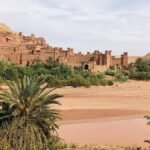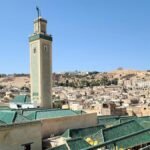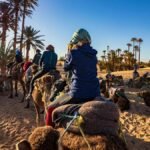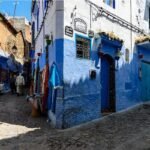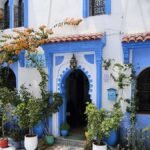Are you conflicted between the cheaper March flights to Morocco and them being scheduled in the midst of Ramadan? Let that not worry you. Ramadan in Morocco is one of the most special spiritual experiences you will ever get to live in a foreign country. You will have yourself privy to an annual ritual in one of the most visited countries in Africa, and NO, you do not have to fast.
Fasting during Ramadan is obligatory upon every Muslim, and anyone of a different religion is at liberty to carry on with his or her days as they normally would. With Morocco being one of the most tolerant Muslim countries in the world, Islam is not forcefully imposed on anyone. As a tourist, you can still indulge in the mouth-watering Moroccan street foods and have a bless as you cruise around the streets of the old medinas sampling the goods and enjoying your cup of mint-tea.
What is Ramadan?
Ramadan is the ninth month on the Islamic calendar where Muslims practice fasting, discipline, patience, humility and spiritual resilience. During this holy month of the year, Muslims refrain from eating, drinking and smoking while entering a state of sexual abstinence from dawn to sunset in obedience to Allah. However, fasting during Ramadan ascends to much more than that. It is a month where Muslims are preached to abandon sinful deeds and invited to embrace piety.
Indulging oneself in virtues, it is a month about the individual, the way one carries himself or herself in public, and the way one disciplines himself or herself when left to one’s own muses, but mostly it is about each Muslim’s relationship with Allah. Ramadan is a month about inculcating good behaviour and achieving peace of mind where Muslims are eventually rewarded with reverence and the presence of God.
The Sentimental and Religious Significance of Ramadan in Morocco
The Sentimental and Religious significance of Ramadan make travelling to Morocco around this Islamic Occasion a lot safer and gratifying than on regular days. You get to experience Morocco in its purest form of spiritual reflection where most individuals are immersed in a holy experience to better themselves.
The Sentimental Significance of Ramadan in Morocco
For Moroccans, Ramadan is a month of celebration where the Muslim Ummah is collectively fasting during the same time. Ramadan, therefore, is thought of as a religious practice that brings people together under a bond of discipline and patience. It leaves an imprint of all these values upon each Muslim including the sentimental value of sympathy. Because fasting is a way to feel the struggle of those with little to put on their table, the Moroccan community admirably lifts the lid on its generosity in the way Moroccans help each other and try ease the struggle of the less fortunate.
The Religious Significance of Ramadan in Morocco
Devotion to Allah is the highest form of worship in Islam and Ramadan enables Moroccans to feel even more drawn to their Din. Through disciplining themselves to remain under divine injunctions, Ramadan for most Moroccans is a month about strengthening their relationship with Allah and becoming more careful with their prayers and Dua.
Ramadan in Morocco: the Rituals
Muslims in Ramadan fast during daylight hours from dawn until they break their fast at sundown. During this month of worship, they eat two essential meals at specific times of the day. To prepare themselves for a long day of fasting, they have a meal before dawn called Suhur. Suhur is meant to fuel them with strength to proceed with their fasting without feeling fatigue or exhaustion. The second meal they have is called Al-Futour, which, quite literally, translates to ‘breaking fast’. Just as the name entails, Al-Futour is the meal they have at sundown to break their fast.
From sundown to dawn, however, Muslims can indulge in eating and drinking as they please. Refraining from committing the wrong deeds remains mandatory throughout Ramadan. Each Muslim must keep from doing anything that might hurt their spiritual connection with Allah, as it is the sole purpose of fasting. Later at night, hundreds of Muslims gather in mosques where Attaraweeh prayer is held. During this prayer, Quran is recited aloud and you can hear the captivating voices of Chouyoukh anywhere you are. It is indeed a transcendental experience to visit Morocco during this holy month of the year.

Moroccans’ Traditions during Ramadan
Moroccans take great pride in the month of Ramadan, as it is a special occasion to display the fusion between Islamic customs and the Moroccan culture. What set Ramadan in Morocco from other parts in the world are without a doubt the food culture, the festive atmosphere and the friendly gatherings of families and friends.
Weeks before the arrival of Ramadan, the majority of Moroccan families, as it is the case with street vendors, start preparing a long list of traditional Moroccan dishes. This includes Chebbakiya (a honey soaked pastry) that Moroccans usually enjoy with Al-Harira soup, Briwat that are a cigar or triangular shaped pastries filled with hearty fillings, and Sellou which is a Moroccan sweet particularly popular during Ramadan.
While you might find Ramadan in Morocco a tiny bit quiet around earlier hours of the day, do not be so surprised when the streets are suddenly buzzing with noises and cities are born to life once again as sundown approaches.
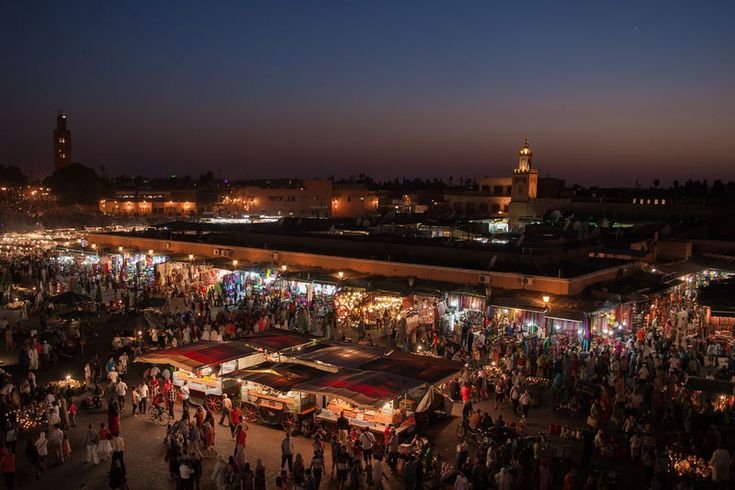
In hours leading to Iftar, most Moroccans rush to the local markets and look for ingredients and dishes to add to their Iftar table. Food stalls become bustling with people and the aromas of the freshly made pastries make your mouth water. It is a festive atmosphere celebrating both this Islamic ritual as well as the distinctive properties of the Moroccan cuisine.
Ramadan in Morocco is about community. It is the time of the year in which families and friends gather around the Iftar table awaiting the call to prayer. People gather for laughter and appreciation for their religion and the blessings of their life. It is also a month of charity and generosity. In a gallant act of solidarity, Moroccans try to help the less fortunate and acts of charity become highly encouraged.
When is Ramadan 2024 in Morocco?
In Morocco, Ramadan 2023 started the 22nd March and ended the 21st April. The expected date of Ramadan 2024 is from the 10th March to the 9th April. However, the exact start day of Ramadan may vary from one country to another. Because the Islamic Calendar is based off the cycle of the Lunar Calendar, it is relatively complicated to determine when exactly a new month starts and when it ends.
Each month on a Lunar Calendar is determined by the sighting of a crescent moon. Once the moon finishes its cycle and goes through all its phases, one month ends and another begins. Ramadan starts on the first day of the 9th month. Spotting the new moon depends on which hemisphere you live in; thus, the not so rare one-day difference between some Muslim countries. Learn more about the Islamic Calendar.
Are Restaurants Open in Morocco during Ramadan?
Much like anytime of the year, all businesses in Morocco are open during Ramadan. Work schedules, however, are commonly modified as Muslims stay up for the Suhur meal and Al-Fajr prayer, which happen around dawn. On that account, most local businesses open later than usual and close an hour or two before sunset.
As eating in public spaces in Morocco is not an illegal activity if you are a tourist, most restaurants in touristic areas remain open during the day and serve the same menu as usual. Check out the Best Touristic Destinations in Morocco
Can you Buy of Drink Alcohol in Morocco during Ramadan?
Morocco is a Muslim country. Meaning, Islam rules everywhere. In Islam, drinking alcohol is forbidden which is why you can never come across people drinking alcohol in public. In Morocco, however, purchasing or drinking alcohol is not an illegal activity as long as you do not drink in public. You can find bars and purchase all kinds of alcohol in Morocco, even locally made ones, all throughout the year without breaking any laws.
Does Ramadan Affect Tourists in Morocco?
Apart from experiencing a one of a kind annual ritual in Morocco, Ramadan does not affect tourists in any way. Tourists are still at liberty to eat and drink in public spaces as they please. All touristic places remain open and the Moroccan community, as a whole, is very accepting of people from different religious backgrounds.

